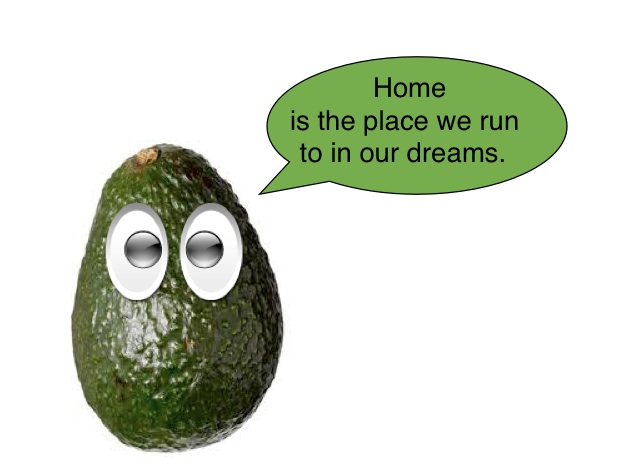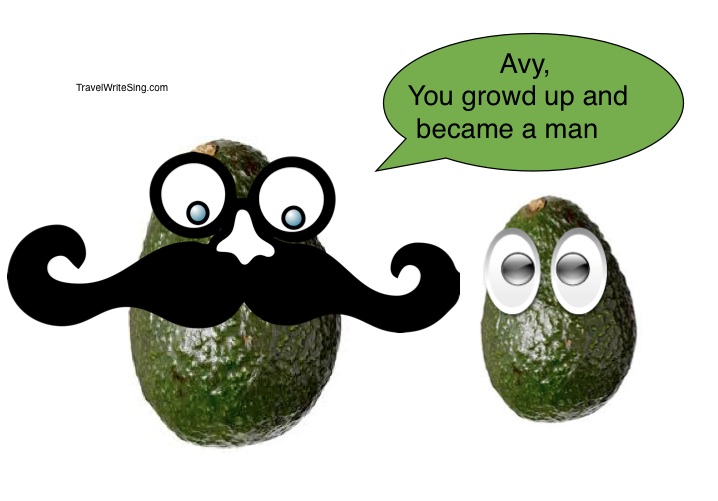Say what anyone will about Guatemala, no one can dispute the fact that the country’s pants are stuffed with avocados. Avocados are to Guatemala what people are to China—they are everywhere in absurd abundance. They are so abundant that people nicknamed Guatemalans living in Antigua green bellies for the inordinate amount of avocados they eat on a regular basis.
Around these parts some avocado trees grow to the size of Godzilla. They fall from the trees into your lunch. Many a dented car had an avocado to thank. Occasionally—and children find this hilarious—they fall and hit people on the head. In New York an avocado costs as much as a Thai massage with a happy ending. In Canada no one has ever tasted one because no one can afford them—they cost eight polar bear pelts. In Iceland people tell stories of avocados around wind swept campfires, but no one there has actually seen one.
In Guatemala, where they are literally falling on you like bird shit on a picnic, an avocado will only set you back a few nickels.
Because of this price difference, and the fact that it is very illegal to bring fruit or vegetable on a plane cross-borders, all avocados know that the exit door of Guatemala locks behind them. It would be a senseless endeavor of absurd economic recklessness and brazen illegality for anyone to bring avocados from the United States of America back to the Republic of Guatemala.
But that is what Amy did. Amy G., a friend of mine who is a former expat living in Antigua is back in town for a wedding. When she passed through Boston airport security there was an avocado in her purse. She then passed several signs in the Guatemalan airport that in very large letters said no outside fruit or vegetables are allowed. Could an avocado—taken from his home in a large freighter—shipped from a distribution center to a grocery store—displayed in a grocery store like a piece of meat—bought by a girl who looked like she was hungry—could he know that the next time he would see the light of day it was the same light at the same angle that had once shined upon him when he was just a blossom in an avocado grove?
This leads to so many more questions, like, When avocados dream do they imagine their homeland? When they yearn do they get a nostalgic feeling in the pit of their pit that they will never return to the land where they chilled amongst the leafs of trees holding their entire family?
We can only imagine that, si! Claro que si! Que tristezas duras existen in la vida de un aguacate! Desde un edad demasiado joven están sacado de un árbol y mandado lejos de su familia para estar comido por gringos!
It’s certainly much more than a plum could bear.
This leads to one final question, What is the matter with Amy? Is she some sort of misled avocado super hero who, like PETA with those lobsters, wanted what was best for avocados—to be repatriated in their homeland. Was she sick and tired of seeing a avocados families torn apart just because we are hungry and they are so delicious and where would we be without Guacamole?
No, like many of the most amazing journeys, the avocado’s unlikely travel was the unintended result of a little luck, some forgetfulness, and being in the right grocery store at the very right time when Amy’s belly said, Mmmmmm-yum-yum, I’m gonna eat me some avocados!
This story, while emotional and heart gripping on the level of “Child rescued from a well,” also leads me to support a certain sort of behavior. They say that you can’t bring in outside fruit or vegetables when you enter a country. But can you bring fruit or vegetable that is from the country you are traveling to? I don’t see why not. It’s not an outsider. I support trying to bring a piece of fruit with you when you are traveling. Going to New Zealand? Bring some Kiwis. Headed to Chile? Pack some Chilean grapes. And don’t even think about leaving for Micronesia without checking a 50 pound breadfruit.
As T.S. Eliot said it better than any watermelon could have, “Fruit shall not cease from importation, and the end of all our chips and salsa dip, perhaps one avocado will make the journey where he started and know the place for the first time.”







